Nobel Prize Highlights AI's Revolutionary Role in Healthcare

Marking a milestone in the fusion of AI with scientific discovery, Demis Hassabis and John Jumper of Google DeepMind, along with David Baker, have clinched the 2024 Nobel Prize in Chemistry. This prestigious recognition is awarded for their pioneering efforts in protein prediction with AlphaFold 2, an AI model that has dramatically advanced our molecular understanding and opened new doors in pharmacology.
"Receiving the Nobel Prize is the honour of a lifetime... AlphaFold has already been used by more than two million researchers to advance critical work, from enzyme design to drug discovery.”
Unravelling molecular mysteries with AlphaFold 2
At the core of this award-winning innovation is AlphaFold 2, DeepMind's AI marvel. It has made significant strides in solving the "protein folding problem" by accurately predicting protein structures based on their amino acid chains. This challenge, which has puzzled scientists for decades, has finally met its match. The AI's accuracy is so unparalleled that it can forecast protein structures to near-experimental precision, offering a faster, cost-efficient alternative to traditional methods like X-ray crystallography.
AlphaFold's journey and its broad impact
From its inception in DeepMind's labs, AlphaFold has transformed the landscape of structural biology. Making its debut in the CASP competition, it soon revolutionized the field with AlphaFold 2's launch, solving complex molecular puzzles with astonishing accuracy. The creation of the AlphaFold Protein Structure Database exemplifies the technology's broad reach, aiding over two million researchers worldwide. This move towards the democratization of AI tools has fueled significant breakthroughs across various scientific disciplines.
Pushing boundaries: beyond proteins
The narrative of AlphaFold doesn't end with its Nobel accolade; the adventure continues with the development of AlphaFold 3. This new version extends its predictive prowess beyond proteins to other biomolecules, offering deeper insights into the blueprint of life itself. AlphaFold 3 brings into play innovations like the Evoformer module and a diffusion network, enhancing our grasp of molecular interactions and paving the way for bespoke medical interventions.
The dawn of an AI-powered scientific era
The Nobel Committee's nod towards AlphaFold is a testament to AI's growing indispensability in science. Its success has rekindled interest in AI's potential across diverse fields, from environmental preservation to precision medicine. The recognition of Hassabis and Jumper's work not only highlights the profound impact of AlphaFold but also heralds a new scientific epoch, where AI will be instrumental in decoding the complexities of life.
Don't forget to check out our Top 10 Ways AI is Improving Healthcare Innovation & Tech, where we look at the impact of Binah.ai, Microsoft, Aidoc, IBEX, ABBYY, Deci, BotCo, Deep Genomics, Novartis and C2-Ai and their use of AI in their digital transformations across the healthcare sector.
Because ahead of IBM, Amazon and Google, Microsoft is leading the way with its AI healthcare solutions. A report by healthcare data company KLAS Research, examined the AI purchase choices of 47 organisations to see which were being selected and which were being replaced - and Microsoft was there at the top. Microsoft Azure’s AI is integrated with other Microsoft products and respondents agreed that Microsoft had better security and a stronger data-protection guarantee.
Read more here.
******
Be sure not to miss the insights and discussions in the latest issue of AI Magazine, and join us at our upcoming global conference series, Tech & AI LIVE 2024.
******
AI Magazine is brought to you by BizClik Media.

